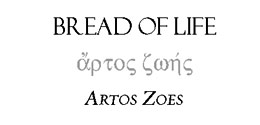From Praying the Names of Jesus Week Four, Day One

The Name
Without bread no one in ancient Palestine would have survived for long. So it seems entirely reasonable for Jesus, in what has become known as the Lord's Prayer, to instruct his disciples to pray for their daily bread. Yet the Lord also challenged his followers not to work for food that spoils, announcing himself as the only food that would enable them to live forever.
In fact, Jesus was born in Bethlehem, which means "house of bread." After feeding five thousand people with only five loaves of bread and two fish, he shocked his listeners by declaring: "Unless you eat the flesh of the Son of Man and drink his blood, you have no life in you" (John 6:53). This week, as you seek to understand what it means that Jesus is the Bread of Life, ask him to show you exactly what it means to feed on him.
Key Scripture
"I am the bread of life. Your ancestors ate the manna in the wilderness, yet they died. But here is the bread that comes down from heaven, which people may eat and not die. I am the living bread that came down from heaven. Whoever eats of this bread will live forever. This bread is my flesh, which I will give for the life of the world." John 6:48-51
***
Monday
His Name Revealed
When they [Jesus' followers] found him on the other side of the lake, they asked him, "Rabbi, when did you get here?"
Jesus answered, "Very truly I tell you, you are looking for me, not because you saw the signs I performed but because you ate the loaves and had your fill. Do not work for food that spoils, but for food that endures to eternal life, which the Son of Man will give you. On him God the Father has placed his seal of approval...
"I am the bread of life. Your ancestors ate the manna in the wilderness, yet they died. But here is the bread that comes down from heaven, which people may eat and not die. I am the living bread that came down from heaven. Whoever eats of this bread will live forever. This bread is my flesh, which I will give for the life of the world."
Then the Jews began to argue sharply among themselves, "How can this man give us his flesh to eat?"
Jesus said to them, "Very truly I tell you, unless you eat the flesh of the Son of Man and drink his blood, you have no life in you. Whoever eats my flesh and drinks my blood has eternal life, and I will raise them up at the last day. For my flesh is real food and my blood is real drink.
Whoever eats my flesh and drinks my blood remains in me, and I in them. Just as the living Father sent me and I live because of the Father, so the one who feeds on me will live because of me. This is the bread that came down from heaven. Your ancestors ate manna and died, but whoever feeds on this bread will live forever." John 6:25 - 27, 48 - 58
Lord, I hunger and thirst for so many things that do not bring real life. Yet you speak of food that will enable me to live forever. Satisfy me with your body and your blood, the bread of your holy presence. Nourish and sustain me now and at the hour of my death. Amen.
Understanding the Name
Bread was baked daily in the ancient world. Made from a variety of grains (barley for the poor and wheat for those with money), it was usually shaped into small round loaves that looked more like rolls or buns than the large loaves of bread we eat today.
Because bread was a primary staple, it was also used in various aspects of worship. Cereal offerings took the form of loaves or cakes, and bread was also used as a firstfruit offering or a peace offering. The Bread of the Presence, consisting of twelve loaves of unleavened bread, symbolized the covenant between God and his people.
Displayed in the temple sanctuary next to the Most Holy Place, it served as a constant reminder to the priests and the people that it was God who sustained the twelve tribes of Israel. Psalm 78:24 - 25 speaks of how God's people were fed in the wilderness:
He [God] rained down manna for the people to eat,
he gave them the grain of heaven.
Human beings ate the bread of angels;
he sent them all the food they could eat.
Bread also played an important role in the Feast of Unleavened Bread. In fact, the bread that was consumed at the Last Supper, as well as the bread Jesus shared with the two travelers in Emmaus, was probably unleavened bread since both meals occurred during Passover Week.
In John's Gospel, Jesus called himself Artos Zoes (AR-tos zo-ASE), the Bread of Life.
Studying the Name
- Jesus knew that bread is one of life's necessities, so what did he mean by counseling his followers not to work for food that spoils? What are the implications for your life?
- Various Christian denominations have interpreted Jesus' words about eating his flesh and drinking his blood differently. How have these words impacted your own spiritual journey?
- Discuss the various ways in which it is possible for a person to "feed on Jesus."
For more from Ann Spangler, please visit her blogspot on Christianity.com. And be sure to check out Ann's newest books on AnnSpangler.com. To hear more from Ann Spangler, sign up today at annspangler.substack.com.
Meet your spiritual ancestors as they really were: Less Than Perfect: Broken Men and Women of the Bible and What We Can Learn from Them.



